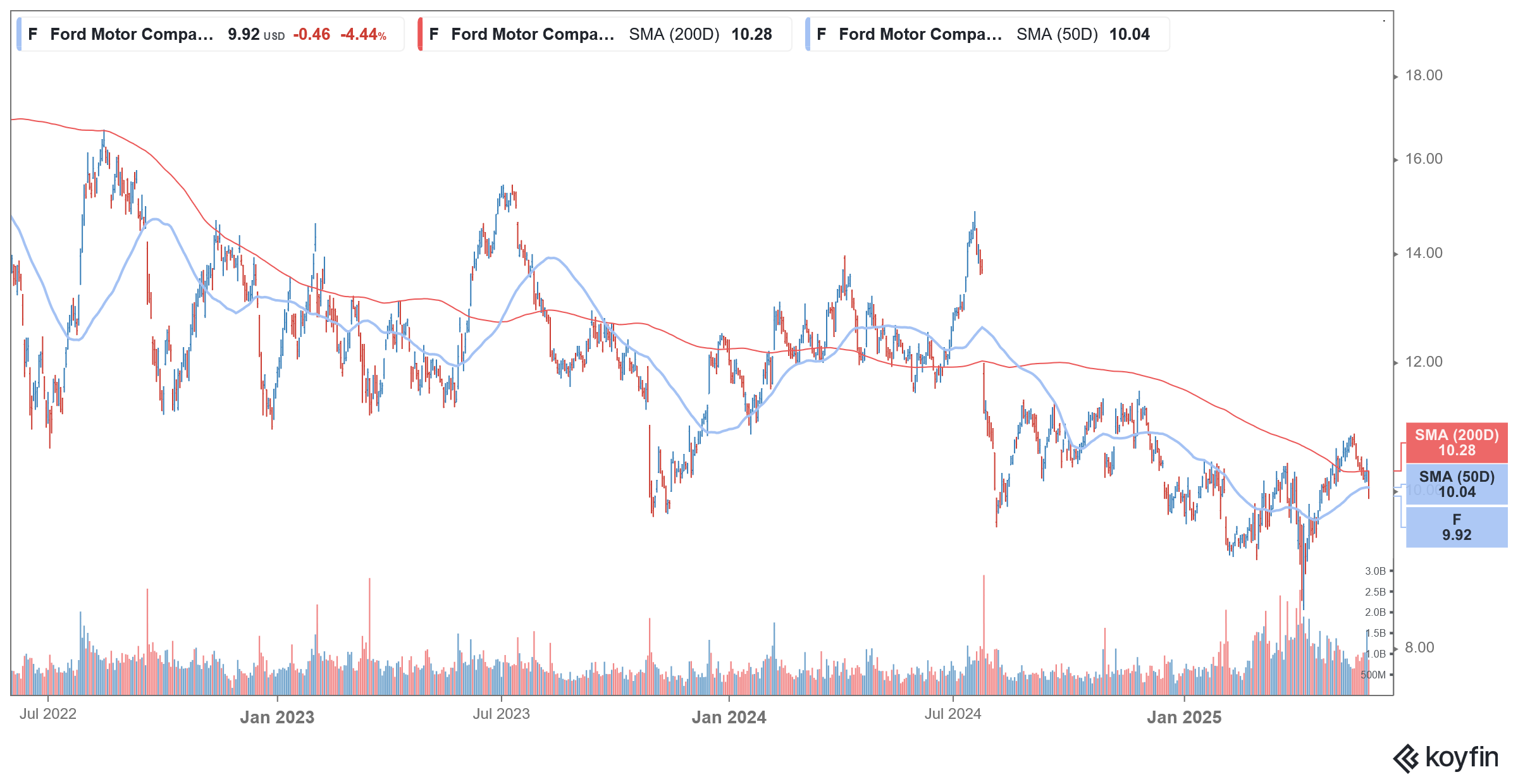Ford and GM Stocks Fall as Trump Doubles Steel and Aluminum Tariffs
Please note that we are not authorised to provide any investment advice. The content on this page is for information purposes only.
Ford (NYSE: F) and General Motors (NYSE: GM) are trading sharply lower while steel stocks are up spectacularly after President Donald Trump doubled the tariffs on steel and aluminum to 50%. The tariffs are set to come into effect from tomorrow and are expected to push up prices in the US, thereby raising input costs for automakers.
The President made the announcement at a U.S. Steel Corporation facility in Pennsylvania that he visited after approving the company’s acquisition by Japan’s Nippon Steel, which he had previously opposed. Along with raising steel and aluminum costs for US industry, the massive tariffs might also lead to an escalation in the trade war, particularly with the EU.
Table of Contents
Trump Doubles Steel and Aluminum Tariffs
The EU has vowed to retaliate against the tariffs and said, “If no mutually acceptable solution is reached, both existing and additional EU measures will automatically take effect on 14 July—or earlier, if circumstances require,” the EU spokesperson said.
Ever since Donald Trump became the 47th US President, there has been a lot of uncertainty over tariffs. While it seemed that the uncertainty would subside after a judge ruled that the President overstepped his authority by imposing “reciprocal tariffs” on nearly all countries, there are signs that the trade war might escalate further.
In a jolt to Trump, a US judge blocked his reciprocal tariffs late last month, which the administration appealed. The U.S. Court of Appeals for the Federal Circuit approved the administration’s request to temporarily pause a lower-court ruling.
Higher Steel Prices Are a Headwind for Automakers
Automakers were already reeling under the impact of Trump’s tariffs on imports of cars and some car parts. The increase in steel and aluminum tariffs has come as yet another jolt to the industry. US steel prices are already among the highest globally, and the tariffs would embolden domestic companies to raise prices further, making it even costlier to make cars in the US.
“This was an absolute surprise. Already steel prices in the U.S. are higher than anywhere else, and it is a net importer which needs to have volumes coming in. All this does is raise prices there,” said Josh Spoores, head of steel Americas analysis at CRU while speaking with CNBC.
While no automaker has yet issued a profit warning on the impact of these tariffs, in 2018, Ford had warned of a hit of $1 billion between 2018 and 2019 from the steel and aluminum tariffs that Trump had imposed in his first tenure. Notably, back then, Trump slapped a 25% tariff on steel imports and a 10% tariff on aluminum imports. This time, he started with a 25% tariff on both metals, which he is now raising to 50%.
Automakers Suspend/Lower Their Guidance
Amid the tariff uncertainty, automakers are either lowering their guidance or suspending it altogether.
GM also held back its 2025 guidance during the Q1 earnings release. However, it later warned of a hit of between $4 billion-$5billion from the tariffs and lowered its adjusted pre-tax earnings guidance to between $10 billion and $12.5 billion, versus the previous guidance of between $13.7 billion and $15.7 billion.
Similarly, it cut the adjusted automotive free cash flow to between $7.5 billion and $10 billion, compared to the previous guidance of between $11 billion and $13 billion.
During the earnings call, CEO Mary Marra said, GM has increased its direct purchases in the US for North American production by 27% since 2019, and over 80% content in its US assembled vehicles is USMCA compliant.
Ford withdrew its 2025 guidance amid the uncertainty over tariffs. Meanwhile, Ford said that if not for the tariffs, it was on track to meet its 2025 guidance of adjusted pre-tax earnings between $7 billion-$8.5 billion.
Stellantis has also suspended its guidance as the automaker grapples with tariff uncertainty that was made worse by company-specific issues, which led to the ouster of its CEO, Carlos Tavares, in December 2024. The company recently appointed Antonio Filosa as its next CEO. Filosa is a company insider and was heading the company’s Americas business.
Trade War Might Escalate Further
While the steel tariffs add yet another uncertainty for the US manufacturing industry, there are signs that the US-China truce is not holding off well. Speaking with Fox News, Treasury Secretary Scott Bessent said that U.S.-China trade talks “are a bit stalled” and would require intervention from top leaders of both countries.
“I think that given the magnitude of the talks, given the complexity, that this is going to require both leaders to weigh in with each other,” said Bessent. He added, “They have a very good relationship and I am confident that the Chinese will come to the table when President Trump makes his [preferences] known.”
In a post on Truth Social, President Trump said that his tariffs hurt the Chinese economy badly. “Two weeks ago China was in grave economic danger! The very high Tariffs I set made it virtually impossible for China to TRADE into the United States marketplace which is, by far, number one in the World. We went, in effect, COLD TURKEY with China, and it was devastating for them. Many factories closed and there was, to put it mildly, “civil unrest,” he wrote on a long post.
Meanwhile, JPMorgan Chase CEO Jamie Dimon has dismissed the notion that China would buckle under President Trump’s tariffs. “They’re not scared, folks. This notion that they’re going to come bow to America, I wouldn’t count on that,” said Dimon.






